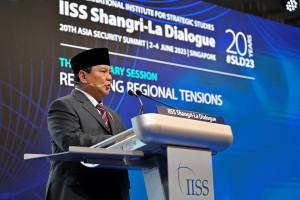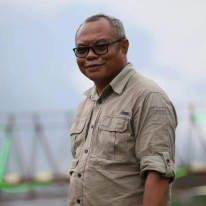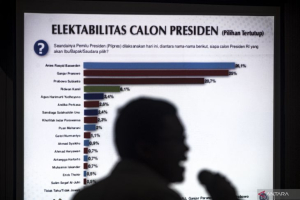International seminar on water security: Defense University of Indonesia address the water crisis with advanced technologies
In response to the growing water crisis in Indonesia, Universitas Pertahanan (Defense University) in collaboration with Indonesia Business Post Media organized a Water Security Seminar - Technology for Indonesia on Friday, September 22, 2023.
Water Security refers to the ability to ensure sustainable access to clean water sufficient for good living, economic development, and environmental protection. It also includes measures to maintain clean water, protection against water pollution and water-related disasters, as well as ecosystem preservation.
The seminar and exhibition, held on September 22, 2023, and was attended by the Rector of Universitas Pertahanan RI, Major General TNI Jonni Mahroza. The event also welcomed international water experts and showcased over 15 domestic and international companies with the latest and most advanced technologies in water conservation and resilience.
This event was also attended by water security expert panellists such as Firdaus Ali, expert staff for Water Resources at the Ministry of PUPR; Ali Berawi, Deputy for Green and Digital Transformation at the National Capital Authority (IKN); and Arief Nasrudin as President Director of PAM JAYA.
Major General TNI Jonni Mahroza, the Rector of Universitas Pertahanan RI, stated that the purpose of this event is to broaden awareness and find solutions to ensure the resilience of water resources by utilizing the most advanced technologies that are suitable for Indonesia's natural conditions, thereby strengthening the country's defense.
Mahroza also emphasized that the Water Security Technology seminar and exhibition is a realization of the request made by the Minister of Defense of the Republic of Indonesia, Prabowo Subianto, to Universitas Pertahanan to research and develop water resource technologies to address the water crisis in Indonesia.
"This seminar is a follow-up to Minister of Defense Prabowo Subianto's call to Universitas Pertahanan RI on September 20, 2022, to research water resource technologies to address the water crisis in Indonesia," he said on Thursday, September 21, 2023.
Meanwhile, Annelis Putri, the founder and CEO of Indonesia Business Post (IBP), collaborated with Universitas Pertahanan RI to invite more than 15 companies and experts in water resilience technology, both from within and outside the country. Annelis emphasized that the selection of these companies was based on the expectations of the Minister of Defense of the Republic of Indonesia and the Rector of Universitas Pertahanan RI that their technologies could support a revolution in water management and water resilience in Indonesia.
Water scarcity threatens most Indonesian territory
Clean water scarcity is one of the most imminent threats facing Indonesia and countries worldwide. According to the United Nations (UN), it is projected that by 2025, the entire world will experience a water crisis.
The UN also estimates that by 2030, global freshwater demand will be about 40% higher than its availability today, due to climate change, human activity, and population growth. Cities including Jakarta, are also at risk of facing similar water shortages.
According to Mahroza, Indonesia's water security is currently heading towards a crisis, marked by droughts in several regions such as Nusa Tenggara (NTT, NTB), Maluku, and Java (Gunung Kidul), as well as flooding in DKI, Bandung, and other cities, as a result of climate change.
The impact of climate change is caused by environmental pollution, particularly air pollution from CO2, NO3, and HSO2, contributing to the greenhouse effect and acid rain.
The greenhouse effect significantly affects global temperature rise, including sea surface temperatures. Increasing sea surface temperatures have triggered phenomena such as El Niño and La Niña, resulting in regions becoming excessively wet or dry.
Regions with excessive rainfall lead to high precipitation and flooding, while excessively dry areas cause drought and water scarcity. These impacts have systemic effects that influence national defense and security aspects, such as decreased availability of clean water, reduced food, agricultural and industrial productivity, natural disasters, and other impacts that affect various aspects of daily life.
Impacts such as:
- Carbon dioxide, methane, and nitrogen oxide pollutants that contaminate the air have significantly increased, enhancing the greenhouse effect.
- Around 90% of the energy trapped in the Earth's system by greenhouse gases is absorbed by the oceans, which then warm up, leading to rising sea levels.
- Notable changes in sea water temperatures have induced the emergence of La Niña and heatwaves.
- The increase in global warming has resulted in significant changes in regional average temperatures and rainfall patterns.
- Storms like La Niña, El Niño, and heatwaves have caused droughts in some regions and floods in others.
Moreover, global climate change has affected Indonesia's climate patterns. Climate change has impacted the availability of clean water, decreased food production and food security, and even led to natural disasters.
Given the above circumstances, it can be concluded that climate change has a serious impact on water resource resilience. Therefore, appropriate mitigation measures are needed to strengthen the country's water resilience and prevent larger national losses.
Consequently, discussions on Water Security are crucial, as water resilience plays a vital role in the context of a sustainable supply chain, ensuring the survival of the Indonesian nation.
Human life and all living beings, food security, health security, industry, and other aspects are all inseparable from water resource resilience.
"Future water crises could trigger conflicts between nations, as the vital value of water affects all aspects of national life and statehood," said Mahroza.
Signing of MoUs with French and Swedish companies
In anticipation of the impending water crisis, Universitas Pertahanan RI has collaborated with various institutions and companies both within and outside the country to develop water resilience in Indonesia.
On this occasion, Universitas Pertahanan RI, represented by the Rector, Major General TNI Jonni Mahroza, signed Memorandums of Understanding (MoUs) with three companies from France and Sweden, witnessed by the Minister of Defense of the Republic of Indonesia, Prabowo Subianto. The three companies are Osmosun and Ellipse Projects from France, and Bluewater from Sweden.
Water access program for remote islands
Osmosun, a French company, possesses technology that utilizes solar energy as the primary resource for water desalination.
Osmosun will collaborate with Universitas Pertahanan RI to implement an access to water program for remote islands, areas that struggle to obtain a clean water supply, and communities with limited access to fresh water sources in Indonesia.
Water resilience development in disaster-prone areas
Bluewater, a Swedish company, has emergency water solutions specifically designed for situations such as earthquakes, floods, fires, or life-threatening conflicts.
Bluewater has signed an MoU with Universitas Pertahanan RI to cooperate in improving access to clean water for Indonesian communities affected by disasters or conflicts.
This solution enables emergency response teams to quickly access pure, clean water, even from heavily polluted water sources.
Digital water resilience research
Ellipse Projects, a French company, also signed an MoU with Universitas Pertahanan RI for joint digital water resilience research programs.
Indonesian companies Gapura Liqua Solutions and PAM Jaya MOYA Indonesia also participated in the exhibition, showcasing their advanced water purification technologies to ensure a supply of high-quality clean water.
Additionally, more than ten companies in the water resource sector, both domestic and international, participated in the event. These included Danone Indonesia, Gapura
Already have an account? Sign In
-
Start reading
Freemium
-
Monthly Subscription
30% OFF$26.03
$37.19/MonthCancel anytime
This offer is open to all new subscribers!
Subscribe now -
Yearly Subscription
33% OFF$228.13
$340.5/YearCancel anytime
This offer is open to all new subscribers!
Subscribe now






